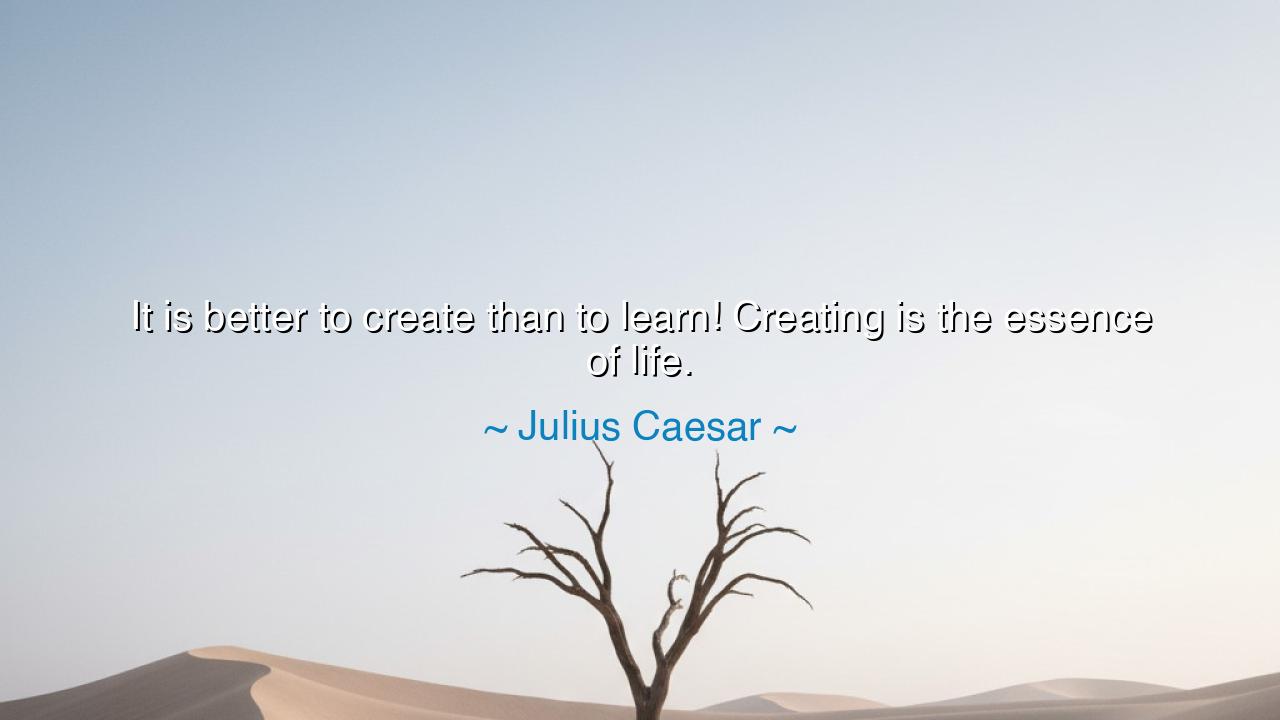
It is better to create than to learn! Creating is the essence of






In the annals of human history, there are few figures whose names have echoed through the ages with as much power and grandeur as Julius Caesar. A conqueror, a statesman, a visionary—his legacy is not one of mere survival but of creation. For Caesar, the true essence of life lay not in the mere accumulation of knowledge, but in the act of creating something that endures. He understood that life is fleeting, and that to truly leave a mark upon the world, one must not simply learn from it, but transform it. It is not enough to absorb what is handed down to us; we must build, shape, and fashion a new reality from the raw materials of our experience.
Consider the great Roman Empire, the civilization that Caesar helped to shape and expand. It was not merely an empire built upon the military conquest of lands, but upon the creation of systems, laws, and ideas that would influence the course of human history. In his time, Caesar knew that in order to preserve his legacy, he needed more than knowledge—he needed action, he needed creation. His reforms in the Senate, his military innovations, his political genius were all efforts not just to govern, but to create an enduring legacy. It was through his ability to shape the world around him that he would remain a figure of immortality, not simply because he learned the ways of his predecessors, but because he added to them, gave them new meaning, and left them for future generations.
There is a great truth in the words, “Creating is the essence of life.” Life, at its core, is an act of creation. From the first spark of life that courses through our veins to the dreams we dare to manifest, we are born creators. When we learn, we take in the wisdom of those who came before us. But it is in the act of creating that we transcend the past and chart our own course forward. It is through creation that we find purpose, and through purpose, life itself becomes imbued with meaning. To learn without creating is to live in the shadow of those who came before. To create is to live fully, to embrace the divine power that flows within us.
Let us recall the builders of the pyramids in ancient Egypt. Their knowledge was vast, their craftsmanship unmatched. But it was not enough to simply learn the arts of stone and construction; they sought to create wonders, to carve out a monument to their civilization that would endure for millennia. These creations were not born of mere imitation, but of vision—the desire to leave a legacy, to transcend the limitations of the present. They did not ask, “What has been learned?” but “What can we create?” And in their creations, they spoke to us across time, offering us a glimpse of their greatness, their genius, their humanity.
Caesar’s words serve as a call to each of us, urging us not to be content with learning alone. There are many who spend their lives acquiring knowledge, endlessly consuming the thoughts of others, but few who take that knowledge and transform it into something new. Whether in the arts, in science, in the very way we live our lives, it is the act of creation that propels us forward. To create is to assert our own place in the world, to leave our unique stamp upon it. Learning, while noble, is the foundation upon which creation stands, but it is creation itself that defines us.
In this way, Caesar’s wisdom is not just a reflection of his time, but a lesson for all time. His life, one of conquest, reform, and vision, was a testament to the power of creation. He knew that to merely exist is not enough; one must shape the world in their image, to leave something lasting for those who come after. And so, we must ask ourselves: What will we create? How will we take the knowledge we have gained and use it to build, to imagine, to reshape the world around us? The path of creation is not always easy—it is fraught with obstacles, with failure, with doubt—but it is through this path that we become truly alive.
Let us then follow Caesar’s example. Let us not simply be learners, but creators—builders of a world that reflects our highest aspirations, our deepest desires, and our most noble dreams. For it is in the act of creation that we leave our mark upon the world, a mark that will endure long after we are gone. Create, and in doing so, you will not just live, but will have lived fully—and that is the greatest gift one can give to the world.






AAdministratorAdministrator
Welcome, honored guests. Please leave a comment, we will respond soon